Thomas Aquinas — The world is divine!
A large part of our civilisation rests on the shoulders of one medieval monk: Thomas Aquinas.
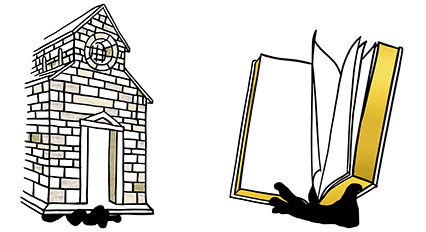
Amid the turmoil of life, riddled with wickedness and pain, he would insist that our world is good.
And all our success is built on this belief.
Note: Before we start, let’s get one thing out of the way: Thomas Aquinas is clearly a Christian thinker, a Saint even. Yet he was also a brilliant philosopher. So even if you consider yourself agnostic or an atheist, stay with me, you will still enjoy his ideas.
What is good?
Thomas’ argument is rooted in Aristotle’s concept of goodness: Something is good if it fulfills its function. Aristotle had illustrated this idea with a knife. A knife is good to the extent that it cuts well. He made a distinction between an actual knife and its ideal function.
That actual thing in your drawer is the existence of a knife. And its ideal function is its essence—what it means to be a knife: to cut well.

So everything is separated into its existence and its ideal essence.

And this is also true for humans: We have an ideal conception of what the essence of a human being is—Aristotle suggested a clear mind and a good character. And in our own personal existence, we can strive to live up to this ideal essence.

Thomas follows Aristotle’s distinction between existence and essence. But he adds one important exception:
God.
God’s essence is to be good. But He doesn’t need to strive for this essence because He already is perfectly good.
God is not just good, he is goodness itself. Likewise, He does not just exist, He is existence itself.
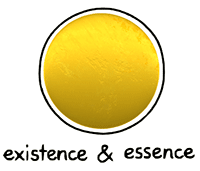
God is equivalent with absolute goodness and being itself.
This unity of existence and essence does not change. And there can only be one. This also makes God the origin of everything, the creator, the unmoved mover.
Created order
a) In creation, essence and existence are separated.
However, things are different with everything that was created by God. As we have already seen, in creation existence is separated from essence. And every existence has the potential to move toward its ideal essence—or away from it.

The closer it comes to its essence, the better it is. The further it moves away from it, the worse it is.
b) Many kinds of good
And what it means to be “good” is different for every being. This is another difference between God and creation: While God is one good, creation is many kinds of good. The good of a knife is to cut well, the good of an eye is to see well, etc.
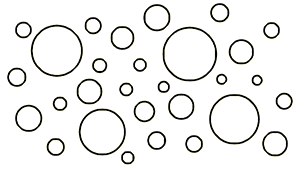
None of them are perfectly good, but together they testify to the absolute goodness of God.
But why all the pain?
I can hear you: “Not perfectly good” is a little bit of an understatement! What about all the suffering in the world?
a) Evil
Or let’s put it this way: If God created everything, did He not also create evil?
Aquinas said: No, evil does not exist.
Evil is a lack of existence, a lack of goodness. Sickness for instance is a lack of health, hunger is a lack of food.

So we can understand evil as the distance of an existence from its essence.
But in addition to this “natural evil” there is also the moral evil of sin. We have a choice—a free will. So we must choose in which direction we want to go.

Our free will comes at a price: We can decide for the good—or against it. And if we decide against it, a great deal of suffering will be the price to pay.
b) Conflict
And as if moral evil was not enough, here is another source of suffering: Think of a gazelle running for its life from a lion. It is good for the lion to eat the gazelle for sure, but isn’t it also good for the gazelle to not be eaten by the lion? Their essences seem to be in conflict with each other.

But when we zoom out a little we can see that the population size of gazelles and lions are in perfect harmony, because they both keep each other in check.

Yet for the individual animal this brings with it a tremendous amount of suffering in the form of hunger or being torn to pieces.
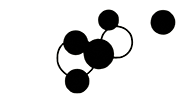
So different kinds of good can be in perfect harmony and yet cause friction among individual creatures. Suffering is a necessary part of the finite nature of creation.
A divine order
So according to Aquinas, a good world does not mean a world without suffering. It is a world in perfect order. And even though we, as finite creatures entangled in the turmoil of life, might not see the big picture, we can still trust that—by and large—everything is well.

And this trust in a good creation, this optimistic attitude towards the physical world and our own biological bodies supports Science.
Faith and Reason
Wait… what? Doesn’t religious faith contradict scientific reason?
Quite the opposite, says Aquinas. Our faith in God and His revelation in the bible anchors us in the world. But we also need to think clearly so we can understand this world.

The faith in a good, structured world and in one truth offers the foundation for a reasonable Science.
Reason on the other hand can examine our religious faith and protect us from errors, superstitions, and substitute religions.
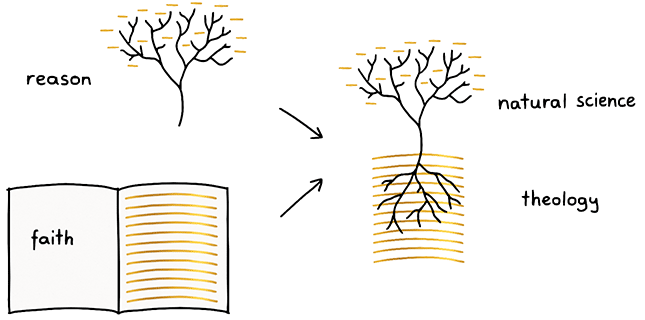
Both, religious and scientific practise serve the same purpose, just in different ways: We can believe in God through scripture and we can experience God when we explore His creation.
The highest good
Our civilisation rests on this combination of faith and reason. We need faith in a good world, for only then can we act rationally.
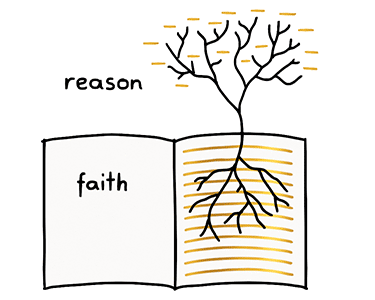
But Thomas Aquinas would warn us: We should not confuse the Christian faith with a trick to make things more comfortable for us—or to improve our civilisation. It is more than just a practical means to an end.
For Saint Thomas Aquinas, God, and thus our faith in God, is the highest end.
If you want to dig deeper
- Thomas Aquinas, Summa Theologica
- Thomas Aquinas, Aquinas’s Shorter Summa
- Jason Eberl, The Routledge Guidebook to Aquinas’ Summa Theologiae
- Thomas Speer, Die Summa Theologiae: Werkinterpretationen (German)
Before you go
If you enjoyed this article, then subscribe to my mailing list to receive more animated stories!
Hats off, Ralph. Clearly written and beautifully illustrated.